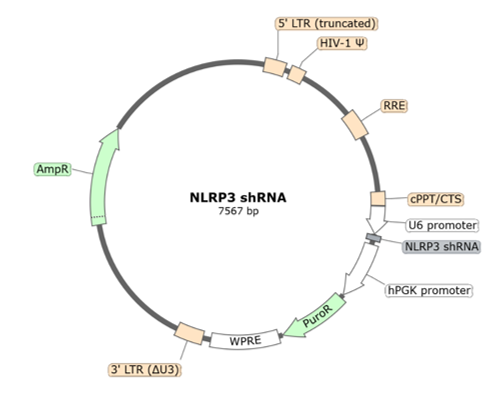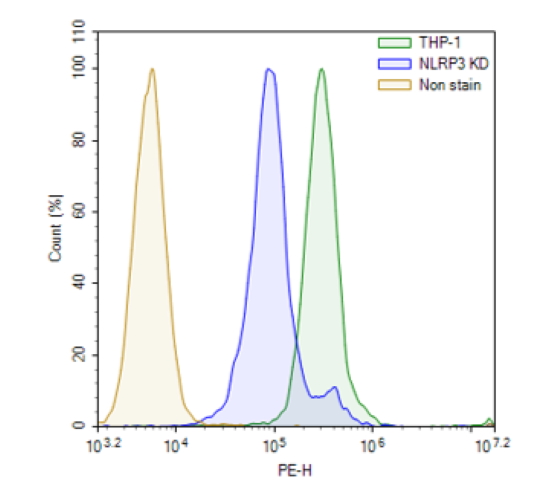NLRP3 Human shRNA Lentivirus
The NLRP3 shRNA Lentiviruses are replication incompetent, HIV-based, VSV-G pseudotyped lentiviral particles that are ready to transduce nearly all types of mammalian cells, including primary and non-dividing cells. These particles contain 3 shRNAs (Short hairpin RNA) targeting human NLRP3 driven by a U6 promoter, and a puromycin selection marker (Figures 1). The sequences of the shRNA used are shown in Table 1.

Figure 1. Schematic of the lenti-vector used to generate the NLRP3 Human shRNA Lentivirus.
Table 1: List of shRNA sequences present in the NLRP3 shRNA Lentivirus.
| Gene Target | shRNA Sequence |
| NLRP3 | GAGACTCAGGAGTCGCAATTT |
| NLRP3 | GGCTGTAACATTCGGAGATTG |
| NLRP3 | TCATCATTCCCGCTATCTTTC |
The lentivirus particles were produced from HEK293T cells in medium containing 90% DMEM + 10% FBS. Virus particles can be packaged in custom formulations by special request, for an additional fee.
NOD, LRR and pyrin domain containing 3 (NLRP3), also known as NALP3 and cryopyrin, is a pattern recognition receptor (PRR) of the NRL (NOD-like receptor) subfamily. It is involved in the detection of microbes, endogenous and exogenous stress signals. It is expressed in macrophages and when bound to PYCARD (adaptor ASC protein) forms a caspase-1 activating complex named NRLP3 inflammasome. NLRP3 detects uric acid and extracellular ATP in damaged cells, and once activated it leads to an immune response. Upon activation, NLRP3 inflammasome releases its partners HSP90 and SGT1, and binds to PYCARD and caspase-1. Caspase-1 initiates the processing and release of the pro-inflammatory cytokines IL-1β and IL-18 and gasdermin D-mediated pyroptotic cell death. Mutations in NLRP3 are known to cause autoinflammatory and neuroinflammatory diseases, such as Alzheimer’s, Parkinson’s, and prion disease. NLRP3 is the most extensively studied inflammasome protein to date due to its array of activators and aberrant activation in several inflammatory diseases. Studies into its function and inhibition can lead to the development of therapeutic avenues for the treatment of auto-inflammatory diseases.
Swanson K et al., 2019 Nature Reviews Immunology 19:477-489.


